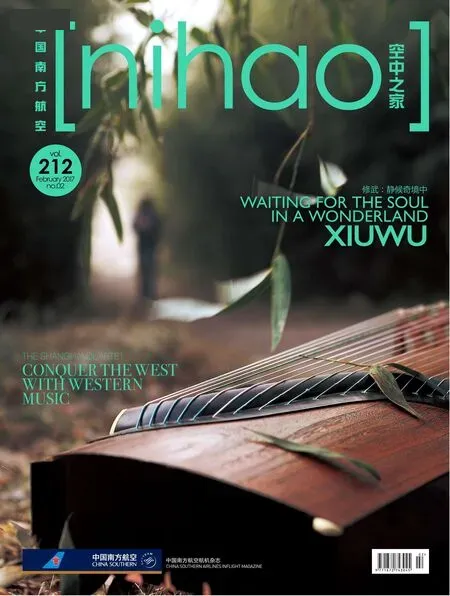Mindfulness in the Middle Kingdom
Text by Lena Gidwani Photo by VCG
Translation by Emma Xu
Mindfulness in the Middle Kingdom
Text by Lena Gidwani Photo by VCG
Translation by Emma Xu

Let it go, let it go. Don't hold it back anymore….
You've probably seen or read something like it before. And I'm not talking about the theme song from the movie Frozen, I'm talking about the idea of letting go of things in your life, whatever that may be.
In early 2014, Time Magazine published a cover story - The Mindful Revolution - signalling the arrival of mindfulness in the mainstream, making its way into schools, corporations, government agencies and more. The article honed in on how folks are incorporating this new-age concept into their lives. But what is mindfulness? Is it any good for us?
Apparently it is. There is a significant amount of wisdom in Eastern thought and evidence to suggest that we should let go of the many things which bind us and keep us from finding peace as well as keep us from experiencing the limitless freedom that exists in our everyday lives. Its techniques can provide significant psychological and physiological benefits. Generally speaking, when people experience stress, our brain activity that's responsible for conscious thinking and planning decreases, while regions that quickly activate the body's stress response increases, elevating the risk of stress-related diseases. Researchers however, have discovered that mindfulness practice actually reverses these patterns. Adoption has been rapid, perhaps due to its potential to help the bottom line: Aetna, an insurance provider, estimates that since

COLUMNIST'S PROFILE
Lena Gidwani is a resident of Guangzhou for 13 years, selfconfessed networker, magazine editor and an avid writer. Lena Gidwani,网络工作者、杂志编辑、作家,在广州居住13年。
instituting its mindfulness program, it has saved about USD$2,000 per employee in healthcare costs, and gained about USD$3,000 per employee in productivity. Transport for London reduced by 71%, the number of days off for stress, anxiety and depression among employees attending a stress reduction and mindfulness workshop.
And these days, it's taking off in China faster than you can say zen. In Beijing, tucked away in the hutongs, the Mindfulness Centre offers both private and group coaching. When the moon is full, there are extra guided meditations offered free. In Shanghai, workshops are offered regularly by various organizations and held anywhere from temples to cafes, for everyone from high-level executives to blue-collar workers. A recent workshop hosted by the American Chamber of Commerce in Shanghai for its members touted practical evidencebased tools for mindfulness in the workplace and home, and had a full house. Kids too are taking on the challenge. Ms. Anna G, an early years teacher at ISA International School in Guangzhou, helps her two-year olds to think more carefully about the consequences of their actions and become more compassionate towards others. “One is never too young, or old, to practice. It develops concentration and self- awareness, and helps with emotional regulation and cognitive focus.”
I agree totally. As a working mother in busy Guangzhou, time is precious, and I build upon the values my children gain both at school and home by taking time during the week to turn off all gadgets and simply focus on being calm and still. It's good for us all to be away from technology and know that we will survive for a short time without texting a friend, answering an email or being on a social network. We extend this to the dinner table too. We eat slowly, even silently (on occasions!), using all our senses to focus purely on the food. We ask the kids to think about where the food originally came from, the process it has been through and how it came to be on their plates. Appreciating the little moments of life, the wonders of nature and the world around us, helps to improve our quality of life and peace of mind, and gratitude for something we usually take for granted and can be very rewarding and more satisfying. Our neighbors, a lovely family from Hunan, have taken heed and now carry out similar exercises with their children, noting a vast difference in behavior.
To mindfulness and beyond, may your life be richer, more peaceful and focused. For what comes next is amazing…
正念在中国
2014年初,《时代》周刊有一期封面文章叫《正念革命》,揭示正念思潮已走向主流。这篇文章阐述了人们如何将正念融入生活之中。然而,什么是正念?对我们是否有益?
东方的智慧很早就有与正念相关的哲思,即对束缚自身的东西放手。正念能为身心带来益处。人在经受压力时,意识思维减弱,压力反应增强,罹患疾病的风险随之提高。研究发现,正念可增强人体对压力的承受能力。
正念在中国也迅速流行起来。北京胡同里的正念中心可以提供一对一或一对多辅导。在上海,有各种组织定期为各阶层人士开办进修班。孩子们也加入了正念大军。一些教师会引导学生多考虑行为后果,多为他人着想。
我个人很推崇正念。在忙碌的广州,作为在职妈妈,时间很宝贵,但我每周都会抽时间关掉所有有干扰的小玩意,集中精神保持身心平静。暂时与科技隔离,意味着我和家人要在短时间内,不发短信,不回邮件,不逛社交网络。用餐时,我们慢慢地、静静地吃饭,全身心感受食物,让孩子思考食物从源头到餐桌的所有经历。享受这点滴时刻,感受自然的神奇,对习以为常的事物怀抱感恩之心,提高了我们生活的质量,也使我们的心态更为平和。
保持正念,寻求超越,祝愿自己的生活更加富足、平静、专注。接下来,你将收获惊喜。

